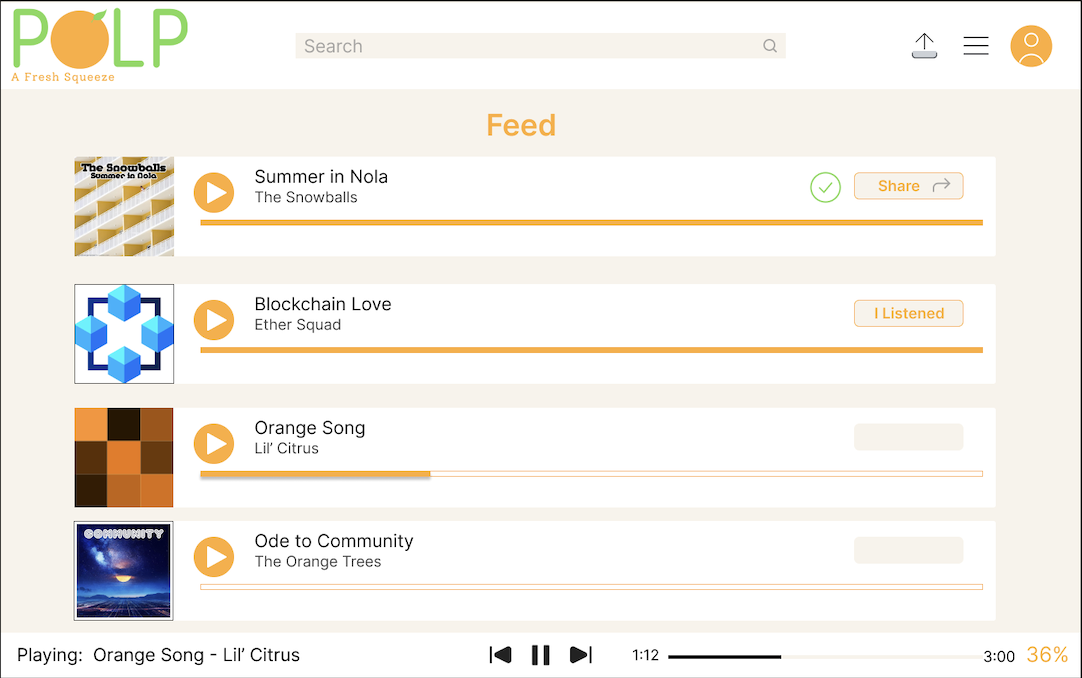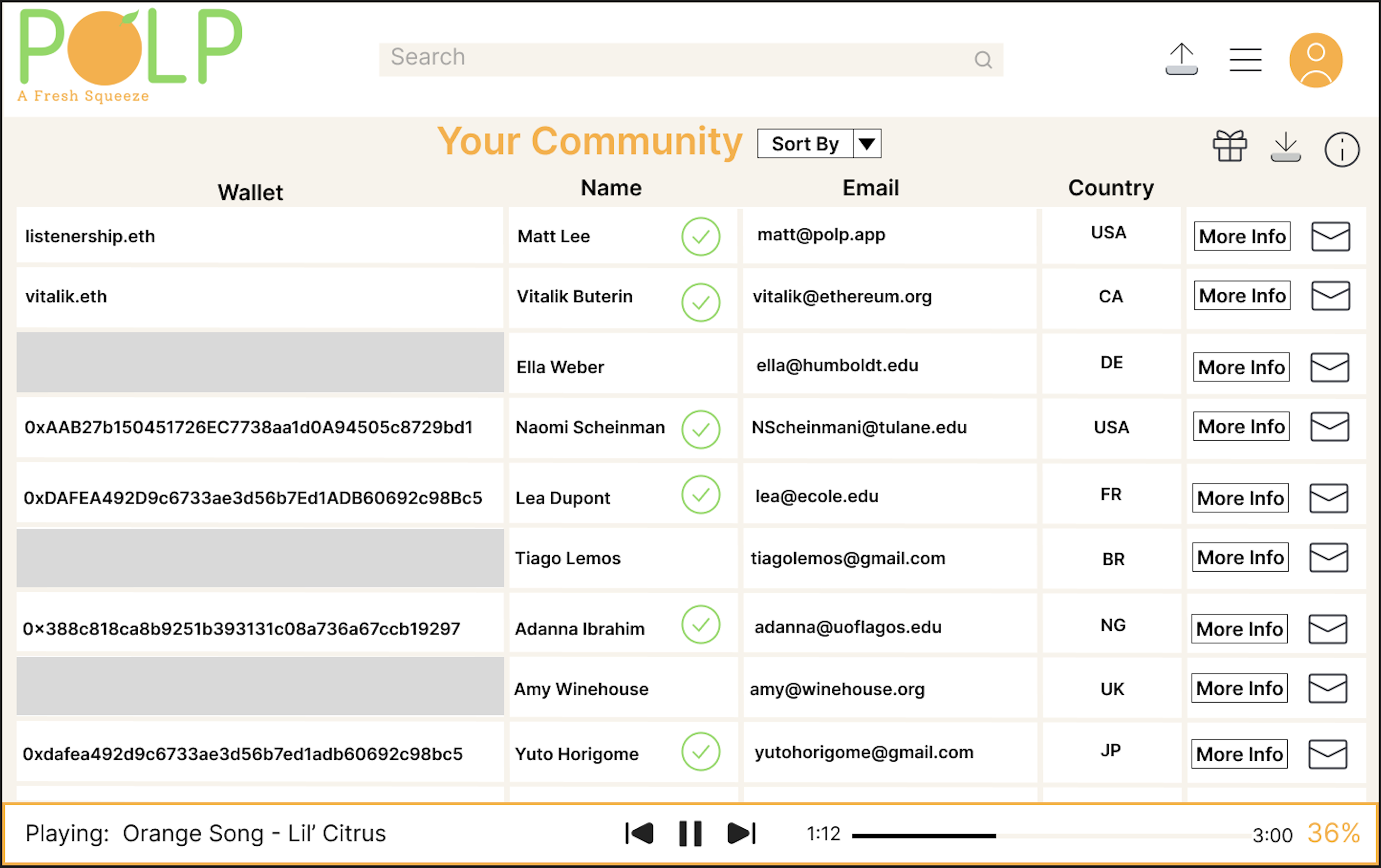POLP White Paper
Abstract
POLP is an application to stream user-generated audio content that incentivizes active music discovery by offering listeners the chance to become a part of the communities of the artists they support. Artists can easily research and interact with their communities through the community management tool. Artists and fans can exchange value with each other directly through their crypto wallets.
Problems
Problem 1: Market Saturation
High Release Volume
60,000 songs are released on Spotify every day. As creating and consuming music becomes ever more accessible, competition among musicians will continue to increase. Even if filtering out low effort releases, there is an impossible amount of music for fans to listen to. This environment is overwhelming for fans and recording artists, who face endless competition from other upcoming talent and all other previously created recordings. The odds are becoming ever-increasingly stacked against musicians. At the heart of this problem is that consuming music takes up the listeners' valuable time, of which they are not rewarded for beyond discovering new music.
Algorithmic Discovery
The over-saturation of music releases has caused algorithmic discovery to become the primary method of finding new music. Services like the Spotify Discover playlist, TikTok, and YouTube recommendations use the data they have about you to predict what you might like and serve it. This can be helpful for many artists and listeners, but there are problems. It means artists are forced to create with the algorithm in mind. They must skew their creations to what an algorithm might promote.
Since so much of this algorithmic discovery happens on social media, artists also must keep up a strong social media presence. While some artists enjoy posting on social media and find it works well for them, others feel that they are forced to broadcast themselves in a way that they don't enjoy or feel comfortable with. Many do not want to constantly make TikToks and other forms of social media content. This type of content creation also takes valuable time away from the artist that they could otherwise use to fulfill their primary goal of making quality music.
Algorithmic discovery can be bad for listeners as well, because it is based on the users' past interests which does not tend to serve new kinds of content. Putting this all together, you get a music discovery landscape that is robotic and uninspired, with artists chasing the algorithm and listeners being passively fed content.
Problem 2: Lack of Community Tools
There has never been a good way for artists and fans to interact directly with each other digitally. It is extremely difficult for artists to keep track of their community and distinguish their earliest and most loyal fans. They are also relinquishing full control of these relationships to third parties.
For social media services such as Instagram, TikTok, and Twitter, interaction is happening on the servers of that company, and all data is owned by them. If users want to leave the platform, they cannot take their connections or content with them because it is not theirs, it belongs to the company. The social media company is simply allowing them to use it. On POLP, the user can download their data whenever they want, and connections are made on a credibly neutral network: the Ethereum blockchain.
Solution
Incentivised Active Discovery
POLP (Proof of Listenership Platform) solves these problems through the incentivisation of active music discovery by giving listeners a chance to be rewarded for their time investment in listening to new music. Listening on POLP makes them a part of that artist's direct community and gives fans the exclusive perks that come with it. For any successful artist, they would not have been able to get a million fans with out getting 100 first. Those first 100 fans are immensely valuable to an artists career. In the current landscape, those early supporters are generally not directly rewarded in any way for their time and loyalty. POLP allows artists to support their earliest fans by creating a wallet to wallet connection between them on the Ethereum blockchain. The artist, equipped with the wallet addresses and other data provided by their earliest and most loyal supporters, is able to reward their fans perpetually throughout their career. This ability to reward listeners comes from the direct transfer of value in the form of tokens that blockchain technology enables. The artist can send tokens representing any type of value that can conceivably be programmed to their loyal listeners, thus giving back to those to whom they owe their career. This connection also enables donations and communication in the other direction: from fan to artist.
Feed

In this first iteration of our user interface, there are 4 songs at different stages in the process of proving listenership. "Ode to Community" has not been played yet. "Orange Song" is playing currently. "Blockchain Love" has been played but listenership is not yet proven, and "Summer in Nola" has been played and listenership has been proven. Once listenership has been proven, the listener will be part of that artist's community.
Community Management Tool

The artist can manage their community with the community management tool (CMT). The CMT is an easy-to-use database that gives artists an unprecedented amount of data about their earliest and most loyal fans. This data will include wallet addresses, email addresses, phone numbers, their school/work, favorite venues, which of your songs they have listened to at what time and how often, how much they've donated, what other social media platforms they follow the artist on, their days of availability and any other information that the fan chooses to share with the artist. However, the fan will not be obligated to share any information besides either their wallet or email. Artists can easily sort their fans by early adopters, most listens, location, and other parameters.
The CMT will also include functionality to interact and exchange value directly with fans. Artists will easily be able to send tokens and directly message their fans. These tokens can represent any type of value that can conceivably be programmed into them, including tickets, discounts on merchandise, and art NFTs; the possibilities of tokenization are expected to expand rapidly as blockchain technology matures. Artists and fans can easily message each other. Artists will be able to easily create and send polls to their listeners to obtain any other information that might be beneficial.
More On Incentivised Discovery
At the heart of POLP's model is a behavioral switch in listeners. Going from passive music discovery enabled by algorithms to non-algorithmic active music discovery. Algorithmic music discovery is more convenient because songs are served to listeners with out having to seek them out. Because these songs are recommended by inputing their recent listens into a machine learning algorithm, there is a high likelihood that they will enjoy what is recommended. The negative aspect of algorithmic discovery is that it does not tend to encourage listeners to branch out and listen to new types of music. Also, there are biases that get unintentionally embedded in these systems due to the complex nature of machine learning, which results in some songs getting arbitrarily recommended often, while others are arbitrarily not recommended at all.
Active music discovery is rare these days because it is time consuming. Using this discovery method takes longer to discover music that the listener loves in comparison to algorithmic discovery. POLP remedies this problem by incentivizing active music discovery through the possibility of being rewarded if an artist you listen to goes on to build a successful career.
Before machine learning, active music discovery was one of the main ways that people found new music. This would take place in record stores. Digging through crates of physical records, whether it was vinyl, tapes, or CDs. The one caveat to this record store analogy is that all the music there has been deemed good enough to include in the store, either by a record label or the store itself.
As POLP becomes saturated with music uploads, we will introduce more ways of making it easier to find great new music. This will start with simple ways of organizing music into categories based on time uploaded, popularity, genre, and artist location. Eventually, recommendation algorithms must be introduced, but unlike the systems that are currently used in all popular streaming applications, POLP's algorithms will be transparent and customizable. Users will know how songs are being recommended to them and change it to their liking. For instance, a user will be able to increase the likelihood of being served a certain genre or songs by artists based in a certain location. Because POLP is not owned or affiliated with major record labels, we are not obligated to favor certain artists and can be transparent with our recommendation systems. Other streaming services, such as Spotify, cannot be transparent or customizable because they are forced to favor major label artists, especially ones who are being promoted in their algorithm through closed-door deals, which of course, they do not want the consumer to know about.
Accessability For Non-Web3 Natives
A significant portion of POLP's functionality requires an Ethereum wallet, yet most artists and fans do not have one. Most of them do not even know what a self-custody wallet is and many even have a negative perception of crypto generally. To leave these folks out would be inconsistent with our mission. The platform must be useable with out a wallet, and we must educate users on the benefits of getting one, gently encouraging them to embrace web3. Although we believe that signing in with Ethereum and direct wallet connections are the future, we are not in the future yet. We must meet our customers where they are before we can guide them to the promised land.
To make the app useful to those without a crypto wallet, users must be given the option to sign in with email in the same way they would in a web2 application such as Instagram. There must also be a way to form connections with artists without use of the blockchain. This can be done in a very similar way to using wallets, with the main difference being that the artist sees just email and other data provided by the user without the wallet address included. There will also be the ability to follow other users, allowing you to easily keep track of their releases and listens, and to quickly access their profiles.
Web3 Onboarding
When a user connects with an artist they really like, they will be motivated to create a wallet and connect it to their profile in order to reap all possible benefits from the connection. On the artist side, they too can create their profile with out a wallet address and access their listener data. They will be incentivized to create a wallet in order to receive donations and reward fans. In addition, listeners are more likely to support an artist with a wallet since they are more likely to reward and interact with them.
Conclusion
Thank you for reading our white paper. We invite any one who wants to learn more or become an early adopter of our platform to reach out to us through Twitter or Email.



